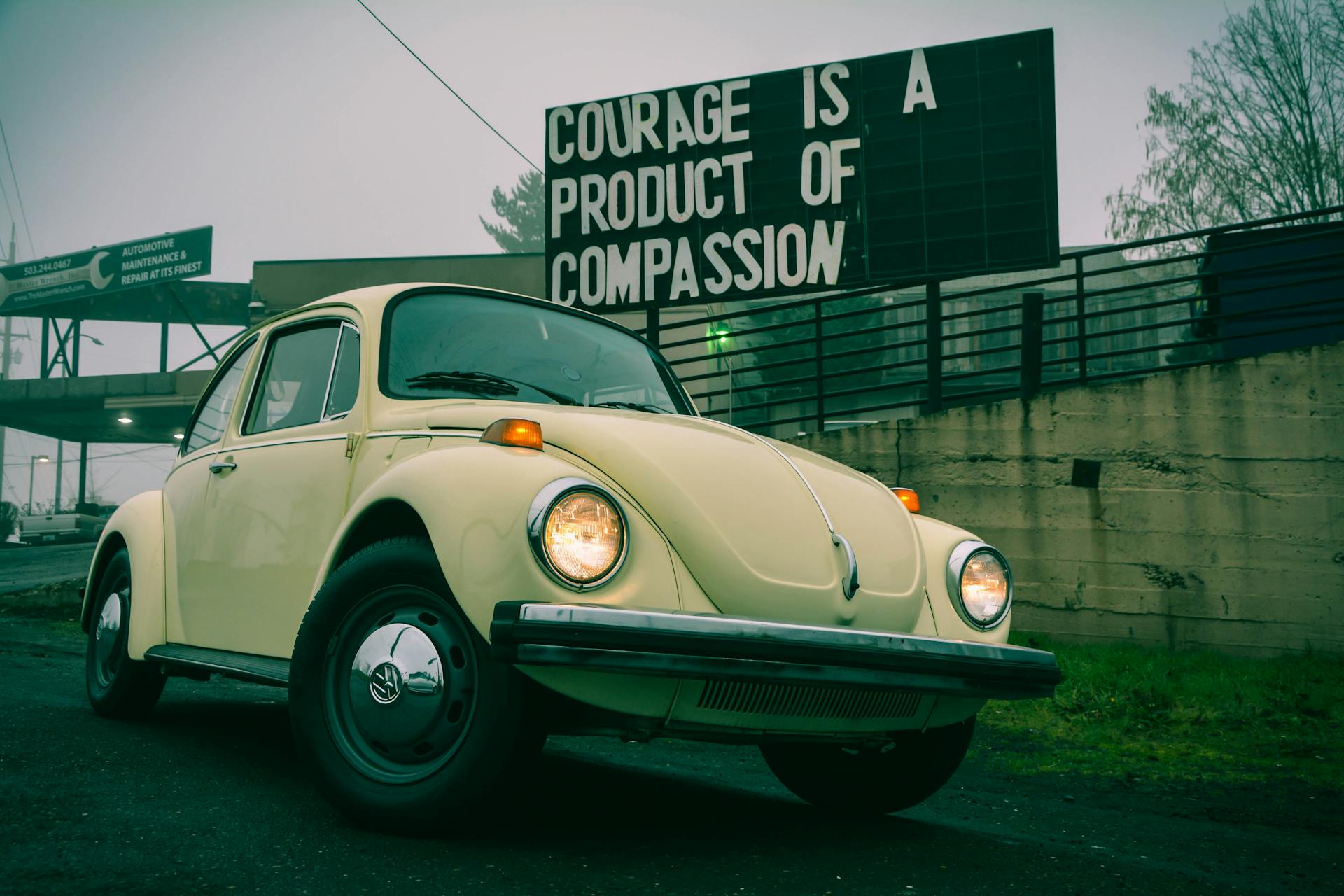
If you own a business that uses vehicles for work, you're likely required to have commercial auto insurance. This type of insurance protects your business from financial losses in case of an accident or other covered event.
Commercial auto insurance requirements vary by state, but most states require businesses to have a minimum amount of liability insurance. For example, in California, businesses with one or more vehicles must have at least $15,000 in bodily injury liability coverage per person and $30,000 per accident.
In addition to liability insurance, businesses may also need to have property damage coverage to protect against damage to other vehicles or property. For instance, in Texas, businesses must have at least $25,000 in property damage liability coverage.
Businesses with multiple vehicles may be eligible for a fleet policy, which can provide more comprehensive coverage at a lower cost.
For more insights, see: Business Property and Liability Insurance
Commercial Auto Insurance Requirements
Most states require commercial auto insurance for business-owned vehicles, specifically liability insurance for injuries and property damage.
Commercial auto insurance requirements vary by state, but liability insurance is the most common requirement.
You may be required to have uninsured/underinsured motorists coverage and medical payments coverage, also known as personal injury protection.
The specifics of what kind of insurance you need depend on how your business uses its vehicles, who is using them, and what types of vehicles are being used.
If you don't have proper commercial auto liability insurance coverage, you can end up paying for vehicle repairs, injuries, and other expenses out of pocket.
Here's an interesting read: Truck Liability Coverage
Policy and Coverage
Your personal auto policy may provide some coverage for business use, but it's not always the best solution. If you use your vehicle for work purposes, you may need to purchase a commercial auto policy to ensure you're fully protected.
Commercial auto insurance can be tailored to fit your business needs, with options for covering vehicles your business owns, hires, or leases. In fact, most businesses should consider covering all autos used for the business, including those they don't own, hire, or lease.
Here's an interesting read: How Does Commercial Insurance Policy Define Hurricane Risk
A commercial auto policy can provide protection against claims arising from business use of a vehicle, including accidents involving employees or passengers. This type of policy is typically required for business-owned vehicles in most states to help pay for medical expenses and property damage.
If your employees drive company vehicles home or use them for personal purposes, you need to ensure you have the right coverage. Employees' personal auto policies won't cover their use of a company car unless it's been borrowed as a temporary replacement for their own vehicle.
There are three options for choosing which vehicles to cover under a commercial auto policy:
- Autos your business owns
- All autos your business owns, hires or leases
- All autos used for the business, including those that your business does not own, hire or lease
The third option is usually the best choice, as it provides the most comprehensive protection for your business.
Liability and Risk
Liability coverage is a crucial part of commercial auto insurance, obligating the insurer to pay damages the business is legally obligated to pay for bodily injury or property damage caused by a covered vehicle, up to the policy limits.
The policy limits are a key factor in determining the extent of liability coverage. For example, if the policy limit is exhausted in judgments or settlements for the first two claimants in an accident, the business is liable to pay the award directly for the third person.
Businesses should aim to have a commercial auto coverage limit of at least $1,000,000, with $500,000 as the minimum, as recommended by many insurers. This higher limit provides additional protection without adding significantly to the premium.
You are liable if you allow a bad driver on the road, and failing to take reasonable steps to determine a driver's qualifications can lead to "negligent entrustment" damages on top of liability for the accident itself.
Broaden your view: Maximum Flood Insurance Coverage for Commercial Property
Penalties
If you fail to maintain required insurance coverage, you'll face serious consequences.
You could have your driving privilege and license plate suspended for up to three years.
There's no temporary or hardship driver license option for insurance-related suspensions, so it's essential to get it right from the start.
To avoid suspension and costly reinstatement fees, turn in your license plate at a driver license office, motor vehicle service center, or Tax Collector's office before canceling your insurance.
You'll also have to pay a reinstatement fee of up to $500 if your driver license/registration is suspended due to lack of insurance coverage.
Liability
Liability is a crucial aspect of business operations, and it's essential to understand what it entails. Your business can be held liable for damages or injuries caused by your vehicles, and this liability can be substantial.
The liability portion of a Business Auto Coverage Form (BACF) obligates the insurer to pay all damages your business is legally obligated to pay because of bodily injury or property damage caused by a covered vehicle, up to the policy limits. This includes judgments or settlements for claims.
In the event of an auto liability lawsuit, the insurer is obligated to defend your business or settle the lawsuit, but their duty to defend or settle ends when the insurance policy limits are exhausted. This means that if the policy limit is exhausted in judgments or settlements for some claimants, your business will be liable to pay the award directly.
Intriguing read: An Insured Has a Life Insurance Policy That Requires
Punitive damages may be awarded in cases of gross negligence, such as drunk or reckless driving, and by law in several states, a BACF cannot cover any punitive damages for which you may be liable. Even in states where coverage for punitive damages is allowed, your policy may exclude them.
Here are some key points to remember about liability:
- The liability portion of a BACF obligates the insurer to pay all damages your business is legally obligated to pay, up to the policy limits.
- The insurer's duty to defend or settle ends when the insurance policy limits are exhausted.
- Punitive damages may be awarded in cases of gross negligence.
- A BACF may not cover punitive damages in some states.
- Your policy may exclude punitive damages even if coverage is allowed in your state.
Understanding liability and taking steps to mitigate risks can help protect your business from financial losses and reputational damage.
Frequently Asked Questions
Do I need regular insurance if I have commercial insurance?
Commercial insurance may provide coverage for both personal and business use, but it's essential to review your policy to understand its specific terms and limitations
Sources
- https://www.flhsmv.gov/insurance/
- https://www.dmv.ca.gov/portal/vehicle-registration/insurance-requirements/
- https://www.nextinsurance.com/commercial-auto-insurance/
- https://www.biberk.com/small-business-insurance/commercial-auto-insurance
- https://www.iii.org/publications/insuring-your-business-small-business-owners-guide-to-insurance/specific-coverages/business-vehicle-insurance
Featured Images: pexels.com


